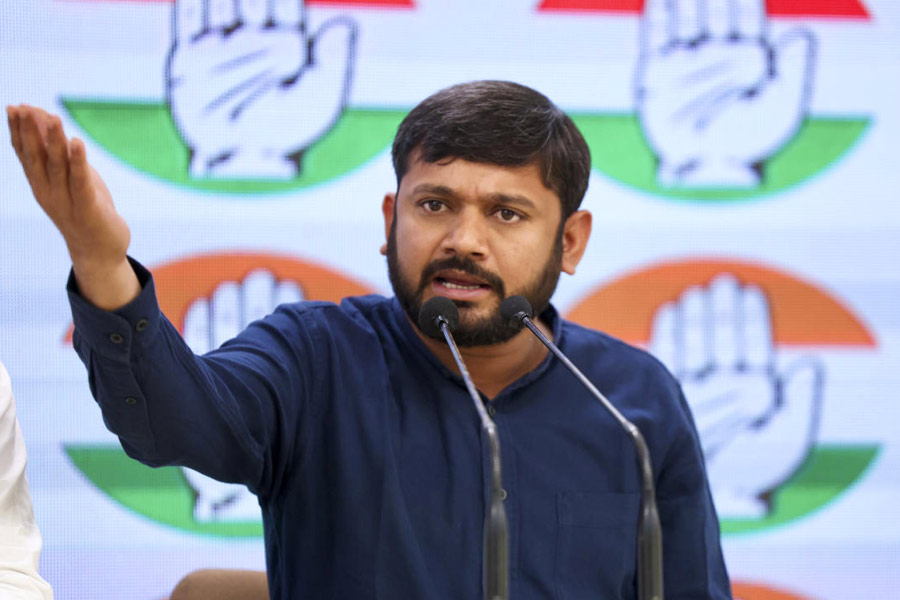Congress leader Kanhaiya Kumar claimed that the Modi government is "roaming around with stickers" to be put on those not echoing its 'mann ki baat', and asserted that being called "anti-national" for questioning the current dispensation's policies should be seen as a "badge of honour".
He also said if one is not being called "anti-national", then it means that one is not doing anything good for the nation.
"If you do something good for the nation then naturally this badge of honour will be pasted on you," Kumar told PTI in an interview.
On some calling Jawaharlal Nehru University (JNU) students "anti-national" after a protest in 2016, the former JNU students' union president said it is a "badge of honour" and not something to feel bad about.
"It is a badge of honour because if you are doing some work about which you are determined that it is right, then those who are affected by that work will say bad things. If someone considers me his enemy, he will not praise me, but will only say bad things about me. I think that if someone wants to hurt you, then it is important that you should not feel hurt," he said.
"Today, whoever questions the government, whether he is a political person or not, is being given this 'badge of honour'. A few days ago, it was being given to farmers, before that it was being given to journalists, before that it was given to students. This government keeps giving this badge from time to time to various sections of society," the Congress leader said.
He said that this is the "era of emojis", noting that earlier people used to be introverts or extroverts, but nowadays people are becoming "textoverts".
"Nowadays any emoji can be easily pasted. This government is roaming around with stickers. As soon as you talk against them, you do not echo their 'mann ki baat', a sticker is easily pasted on them," he said.
Asked about the speech given by him after his release from jail in a case of alleged anti-national sloganeering on the JNU campus, he said that it was the most important part of his life.
In this country, it is a matter of great fortune to get a chance to go to school and college but it should not be so, he said.
Education should not be a privilege, it should be a right and it became one during the UPA's rule, Kumar said.
Talking about his JNU days, Kumar said it was the best opportunity to study in the most prestigious university of the country and he got a chance to understand the country and the world.
JNU has made great contribution in nation building, and even in this government, several ministers have studied there. Many secretaries and even nobel laureates are its alumni, he said.
"I always believe that was an important period of my life. This was my journey...I want that line ('azaadi' slogan) to always remain in my mind so that I keep remembering it so that I can contribute to society," he said.
On whether the slogan is still relevant today, Kumar said, "The slogan of 'Azaadi' is still relevant. Even today, I raise this slogan in movements. I believe that when darkness is increasing in society, we should talk about light. During the British rule, we were 'subjects', then we became citizens. Now, the entire system wants to reduce us to numbers." "Does being a citizen mean that we only talk about numbers? Efforts are being made in this country to make people slaves again mentally. Nowadays the government is not being questioned but the opposition. Everything is being turned upside down," he claimed.
If Narendra Modi is the prime minister of the country today, it is because the founding fathers created democracy in the country, he asserted.
"I say that if Jawaharlal Nehru had not become the first prime minister of the country, Narendra Modi would not have been the prime minister of the country today. We are seeing that there is talk of destroying the spirit of equality. When slavery is being talked about, there is a need to speak loudly about freedom. When we talk about freedom, we talk about freedom from problems within the country," Kumar said and added that the "azaadi" slogan is relevant today and will remain so in the future.
Asked about starting his politics with the Left, then moving to the centre and will he now move further right, Kumar said he had never been an extreme leftist, and even in the leftist group, he was among the centrists.
"They used to call us the Congress of the Left. Even today we are not extreme, nor will we go in that direction in the future. I think extremism was never accepted in India," he said.
Except for the headline, this story has not been edited by The Telegraph Online staff and has been published from a syndicated feed.











